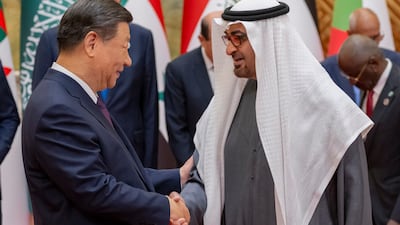Chinese investments in Dubai are gaining traction in sectors including logistics, clean energy technologies and artificial intelligence as the East Asian country looks to long-standing partners to cultivate business opportunities.
The emirate is hosting the Dubai Business Forum-China in Beijing on August 21 and 22 to explore how the two cities can bolster non-oil trade. More than 50 Dubai-based companies and 350 Chinese companies will participate in the event, which will be held at the capital of the world's second-largest economy.
“China-UAE relations have been expanding over the past years,” Sara Bazoobandi, a research fellow at the German Institute for Global and Area Studies, told The National.
“The UAE has been an important destination for Chinese entities and one of the first countries in the Gulf to do business with. Though China has also expanded its ties with other GCC states, particularly Saudi Arabia, the UAE and especially Dubai, given its capacity and hospitable environment to attract foreign investors, is expected to remain attractive.”
The UAE and China established diplomatic relations in 1984. The two countries signed the bilateral investment treaty in 1993, according to the UN Conference on Trade and Development.
China’s ties with the UAE have been increasing with new trade and investment agreements between the two as the Arab world's second-largest economy continued to grow with diversification efforts.
In 2023, the UAE's non-oil trade with China grew 4.2 per cent annually to reach Dh296 billion ($81 billion), with China remaining the UAE's top non-oil trade partner, accounting for 12 per cent of the nation’s trade, according to Wam.
Non-oil trade between Dubai and China also surged during the period to $67.8 billion, up 4 per cent compared to the previous year, the latest data from Dubai Chambers shows. There were 5,100 Chinese companies operating in Dubai by the end of the first quarter.
“The UAE and China's exceptional economic partnership continues to develop, reaching new heights of competitiveness,” Ben Simpfendorfer, a partner at Oliver Wyman based in Hong Kong, said.
“Collaborative efforts are expanding in sectors of mutual interest, particularly the new economy, entrepreneurship, tourism, aviation, and logistics.”
He added that Chinese firms are “internationalising fast” as they search for new growth opportunities and expand their operations.
“The Middle East is a hotspot and Dubai is naturally on the radar. We expect further investments across a range of sectors, from logistics firms, clean energy technologies, to mobile game giants.”
Emboldening partnerships
China is boosting ties around the world as it faces increased pressure from the US and Europe with restrictions on its export of goods and investments.
This year, US President Joe Biden unveiled steep tariffs on Chinese imports, including on electric vehicle batteries, to protect its industries. Months later in July, Europe imposed tariffs on Chinese EV exports.
Among the companies that have opened their offices in Dubai include Chinese clean energy company Longi. Last year, electronics company Hisense unveiled its research development centre in Dubai, focusing on the development and localisation of products for consumers in the Gulf region.
In February, Terminus Group, an artificial intelligence-backed smart mobility services provider, opened its regional headquarters in Dubai as part of its regional expansion plans.
Burgeoning business
Chinese businesses are increasingly developing interest in setting up regional branches in Dubai, with particularly free zones experiencing rapid growth.
The Dubai Multi Commodities Centre also revealed a 25 per cent year-on-year increase in new Chinese companies setting up operations in the free zone in 2023.
Ifza, a free zone community in Dubai, also said there has been a “significant sharp rise in the number of Chinese firms choosing” the free zone this year compared to the previous year, according to Jareer Jadallah, director of client relations at Ifza. The free zone supports Chinese companies across sectors such as investment holding, general trading and IT consultancy.
“Dubai offers Chinese firms access to a fast-growing domestic market. It is also a platform for Chinese firms expanding into regional markets – not just the Middle East but also Africa and South Asia – as Dubai is one of the most important global hubs in the region,” Mr Simpfendorfer said.
The growing partnership was demonstrated this week as Dubai Chambers signed an initial agreement with China Construction Bank – DIFC Branch to promote investment co-operation and strengthen joint efforts to support Chinese companies planning to expand in the Dubai market.

This follows another agreement last week between Dubai Financial Market and Shenzhen Stock Exchange last week to boost collaboration and advance cross-border trading and investment opportunities between the two.
As part of the deal, both exchanges will explore co-operation on dual-listing, exchange traded funds (ETFs), mutual display of indices and fixed-income products as well as “facilitating a more informed and convenient access to secondary market activities in both countries”, according to a Dubai Media office statement.
“Chinese investments will evolve alongside Dubai’s growing status as a regional hub for Chinese firms. We would expect to see more advanced sectors grow fastest, such as biopharma or artificial intelligence-backed solutions,” Mr Simpfendorfer added.
The two countries are also bolstering ties in the travel and tourism sector as a number of travellers from China continue to rise.
In June, Etihad Airways signed a joint venture with China Eastern Airlines as the companies seek to develop and grow routes between the UAE and China.
The agreement, signed in Abu Dhabi, is the first such commercial alliance between a Middle Eastern and Chinese airline and will create a stronger combined network, Etihad said at the time.
President Sheikh Mohamed visited Beijing in May and the UAE and China signed agreements to boost co-operation in investments, the Belt and Road Initiative, industry and technology.


